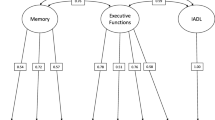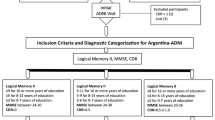Abstract
The Alzheimer’s disease Cooperative Study (ADCS)-Cognitive Function Instrument (CFI) is a 14-item questionnaire administered to the subject and the referent, aimed at detecting early changes in cognitive and functional abilities in individuals without clinical impairment. It is used for monitoring annual variations in cognitive functioning in prevention trials. The aim of the present study was to validate the Italian version of the CFI. A consecutive series of 257 functionally independent subjects was recruited among relatives of patients or as volunteers. They were administered CFI and global cognition measurements: Mini-Mental Status Examination (MMSE) and Repeatable Battery for the Assessment of Neuropsychological Status (RBANS). The reliability and criterion validity were comparable to the original in both self- and partner-report. Similarly to what reported in the original version, we found a corrected item-total correlation ranging between 0.38 and 0.54 in self-report and between 0.33 and 0.64 in partner-report. Cronbach’s α was 0.77 (95% CI 0.72–0.83) in self-report and 0.78 (95% CI 0.73–0.84) in partner-report. Total partner- and self-report scores were significantly correlated (rS = 0.31, p < 0.001). CFI self-report and CFI total-score (partner + self-report) were negatively correlated with MMSE (rS = − 0.15, p = 0.022; rS = − 0.17, p = 0.008) and RBANS (rS = − 0.22, p < 0.001; rS = − 0.25, p < 0.001). Analogous trends were found in the partner score, with a correlation with RBANS (rS = − 0.17, p = 0.014) and MMSE (rS = − 0.11, p = 0.071). Our results support the reliability and validity of the Italian version of CFI. In order to definitely propose the use of CFI for tracking longitudinal changes of cognitive and functional abilities in subjects without clinical impairment, data from the follow-up of this cohort are needed.
Similar content being viewed by others
References
Dubois B, Hampel H, Feldman H et al (2016) Preclinical Alzheimer’s disease: definition, natural history, and diagnostic criteria. Alzheimers Dement 12(3):292–323. https://doi.org/10.1016/j.jalz.2016.02.002
Sperling RA, Aisen PS, Beckett LA et al (2011) Toward defining the preclinical stages of Alzheimer’s disease: recommendations from the National Institute on Aging-Alzheimer’s Association workgroups on diagnostic guidelines for Alzheimer’s disease. Alzheimers Dement 7(3):280–292. https://doi.org/10.1016/j.jalz.2011.03.003
Jessen F, Amariglio RE, Van Boxtel M et al (2014) A conceptual framework for research on subjective cognitive decline in preclinical Alzheimer’s disease. Alzheimers Dement 10(6):844–852. https://doi.org/10.1016/j.jalz.2014.01.001
Walsh SP, Raman R, Jones KB, Aisen PS, Alzheimer's Disease Cooperative Study Group (2006) ADCS prevention instrument project: the mail-in cognitive function screening instrument (MCFSI). Alzheimer Dis Assoc Disord 20(4 Suppl 3):S170–S178
Amariglio RE, Donohue MC, Marshall GA et al (2015) Tracking early decline in cognitive function in older individuals at risk for Alzheimer’s disease dementia: the Alzheimer’s disease cooperative study cognitive function instrument. JAMA Neurol 72(4):446–454. https://doi.org/10.1001/jamaneurol.2014.3375
Randolph C, Tierney MC, Mohr E, Chase TN (1998) The repeatable battery for the assessment of neuropsychological status (RBANS): preliminary clinical validity. J Clin Exp Neuropsychol 20(3):310–319. https://doi.org/10.1076/jcen.20.3.310.823
Folstein MF, Folstein SE, McHugh PR (1975) “Mini-mental state”: a practical method for grading the cognitive state of patients for the clinician. J Psychiatr Res 12(3):189–198
Ponteri M, Pioli R, Padovani A, Tunesi S, De Girolamo G (2007) RBANS repeatable battery for the assessment of neuropsychological status. Edizione italiana. Giunti O.S
Petersen RC, Smith GE, Ivnik RJ, Kokmen E, Tangalos EG (1994) Memory function in very early Alzheimer’s disease. Neurology 44(5):867–872
Feher EP, Mahurin RK, Doody RS, Cooke N, Sims J, Pirozzolo FJ (1992) Establishing the limits of the mini-mental state. Examination of ‘subtests. Arch Neurol 49(1):87–92
Reise SP, Moore TM, Haviland MG (2013) Applying unidimensional item response theory models to psychological data. APA handbook of testing and assessment in psychology: test theory and testing and assessment in. Ind Organ Psychol 1:101–119. https://doi.org/10.1037/14047-006
Cronbach LJ (1951) Coefficient alpha and the internal structure of tests. Psychometrika 16(3):297–334. https://doi.org/10.1007/BF02310555
R Development Core Team (2012) R: a language and environment for statistical computing. R Found Stat Comput Vienna Austria ISBN: 3–900051–07-05
Revelle W (2014) Psych: procedures for psychological, psychometric, and personality research. Northwest Univ Evanston, Illinois
Caselli RJ, Chen K, Locke DE et al (2014) Subjective cognitive decline: self and informant comparisons. Alzheimers Dement 10(1):93–98
Wolfsgruber S, Wagner M, Schmidtke K, et al. (2014) Memory concerns, memory performance and risk of dementia in patients with mild cognitive impairment. PLoS One, 9(7). https://doi.org/10.1371/journal.pone.0100812
Author information
Authors and Affiliations
Corresponding author
Ethics declarations
Conflict of interest
The authors declare that they have no conflicts of interest.
Appendix 1
Appendix 1




Rights and permissions
About this article
Cite this article
Chipi, E., Frattini, G., Eusebi, P. et al. The Italian version of cognitive function instrument (CFI): reliability and validity in a cohort of healthy elderly. Neurol Sci 39, 111–118 (2018). https://doi.org/10.1007/s10072-017-3150-z
Received:
Accepted:
Published:
Issue Date:
DOI: https://doi.org/10.1007/s10072-017-3150-z




